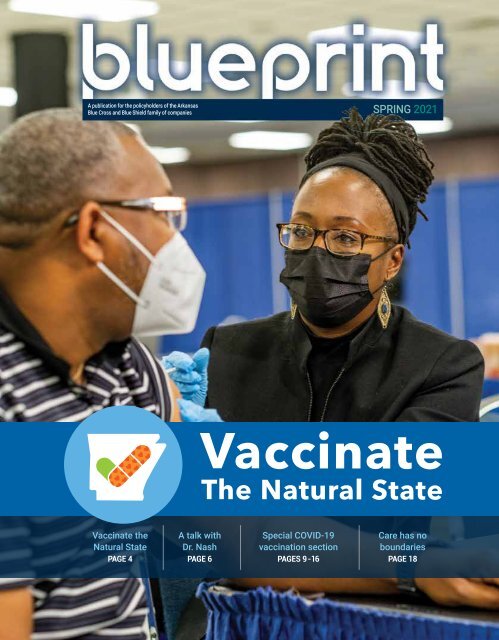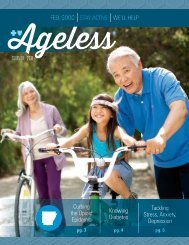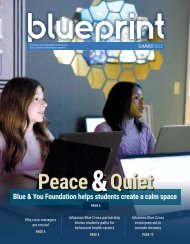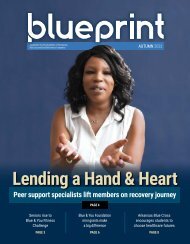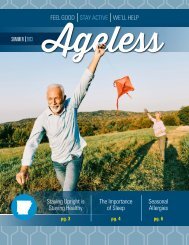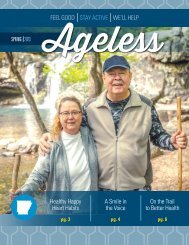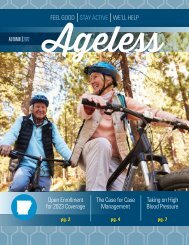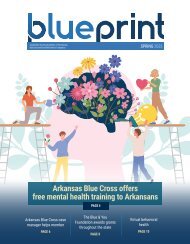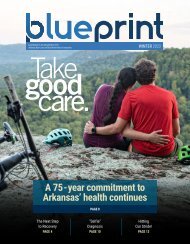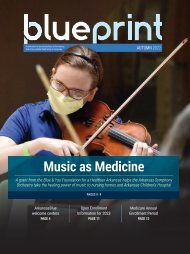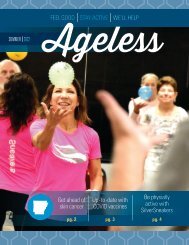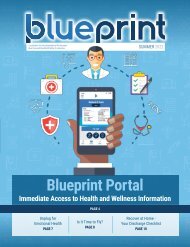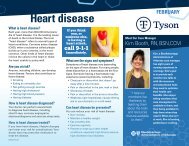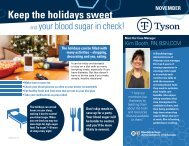Blueprint magazine-SPRING 2021 issue
This issue of our member magazine focuses on COVID-19 vaccines and the Vaccinate the Natural State coalition's campaign, which seeks to help bring the coronavirus pandemic to an end.
This issue of our member magazine focuses on COVID-19 vaccines and the Vaccinate the Natural State coalition's campaign, which seeks to help bring the coronavirus pandemic to an end.
Create successful ePaper yourself
Turn your PDF publications into a flip-book with our unique Google optimized e-Paper software.
A publication for the policyholders of the Arkansas<br />
Blue Cross and Blue Shield family of companies <strong>SPRING</strong> <strong>2021</strong><br />
Vaccinate the<br />
Natural State<br />
PAGE 4<br />
A talk with<br />
Dr. Nash<br />
PAGE 6<br />
Special COVID-19<br />
vaccination section<br />
PAGES 9-16<br />
Care has no<br />
boundaries<br />
PAGE 18
a<br />
Word<br />
with Curtis Barnett<br />
Our President and<br />
Chief Executive Officer<br />
<strong>SPRING</strong> <strong>2021</strong><br />
Vaccines: A step toward “normal”<br />
We’ve all been anxiously awaiting<br />
the end of the COVID-19 pandemic …<br />
and a return to “normal” life.<br />
And now we have entered an<br />
incredibly hopeful – and vitally<br />
important – stage of our journey out<br />
of this historic public health crisis.<br />
Our hope is fueled by the longanticipated<br />
deployment of new<br />
COVID-19 vaccines that are both<br />
safe and effective.<br />
Vaccines are marvels of medical<br />
science, but they cannot work<br />
unless enough of us do our part<br />
and accept them.<br />
As a company whose primary<br />
concern is the health and wellbeing<br />
of our members and our<br />
communities, Arkansas Blue<br />
Cross and Blue Shield is committing<br />
substantial effort and resources<br />
to help keep people safe and work<br />
to end the pandemic.<br />
We’re in the process of ramping up<br />
internal and external initiatives to<br />
encourage people to accept the vaccine<br />
as soon as it’s their turn. We are:<br />
• Working with partners throughout<br />
Arkansas to produce a multifaceted<br />
grassroots outreach<br />
and communications initiative<br />
– “Vaccinate the Natural State” –<br />
about COVID-19 vaccines.<br />
• In partnership with the Arkansas<br />
State Chamber of Commerce/<br />
Associated Industries of Arkansas<br />
and the Arkansas Foundation for<br />
Medical Care, Northwest Arkansas<br />
Council and Walmart, we are reaching<br />
out to employers to help prepare them<br />
for getting employees vaccinated and<br />
returning to the workplace.<br />
• Focusing on underserved<br />
populations in our state (like the<br />
African American, Latinx, Pacific<br />
Islander and rural communities),<br />
we are working with the Arkansas<br />
Minority Health Commission, the<br />
Northwest Arkansas Council and<br />
UAMS to address some culturespecific<br />
hesitancies, fears and<br />
misperceptions; ensure ready<br />
access to the vaccines; and<br />
promote vaccination.<br />
• Assisting in facilitating<br />
and promoting COVID-19<br />
vaccination events statewide.<br />
There are lots of different views<br />
on COVID-19 vaccination. And it’s<br />
understandable that some people<br />
may be confused or conflicted.<br />
But for me, it’s simple: It’s about<br />
family and the preciousness of life.<br />
My greatest pandemic fear has<br />
been the possibility of infecting<br />
my 81-year-old mother, who<br />
already suffers with heart and lung<br />
conditions. I’m going to do my<br />
best to avoid that tragic scenario<br />
by staying safe … and getting the<br />
vaccine as soon as I can.<br />
Vaccination protects my family,<br />
supports the valiant efforts of our<br />
heroic healthcare workers and<br />
scientists and honors the memory of<br />
those who have fallen to COVID-19.<br />
It would be a shame to let vaccine<br />
fear, mistrust and misinformation<br />
allow the pandemic to rage on and<br />
claim even more lives.<br />
So let’s all do our part by washing<br />
our hands, watching our distance,<br />
wearing a mask … and getting the<br />
vaccine as soon as it’s our turn.<br />
EDITOR<br />
Jennifer Bridgeman<br />
Editor@arkbluecross.com<br />
DESIGNER<br />
Ryan Kravitz<br />
PHOTOGRAPHERS<br />
Chip Bayer<br />
David Lewis<br />
CONTRIBUTORS<br />
Chip Bayer<br />
Katie Eisenhower<br />
Suzi Parker<br />
Greg Russell<br />
Marie Trotter<br />
VICE PRESIDENT<br />
of CORPORATE<br />
MARKETING<br />
Alison Melson<br />
MEDICAL<br />
REVIEWERS<br />
Mark Jansen, M.D.,<br />
vice president and<br />
chief medical officer<br />
Creshelle Nash, M.D.,<br />
medical director for<br />
Public Programs<br />
NOTE: Read about the entire effort and a listing of all partners on pages 4-5.<br />
2 <strong>SPRING</strong> <strong>2021</strong>
Overdoses up amid pandemic<br />
Help is available<br />
While the<br />
United States<br />
has been battling a global<br />
pandemic, a drug epidemic<br />
continues to silently rage<br />
through the country.<br />
More than 81,000 drug<br />
overdose deaths occurred in the<br />
United States in the 12 months<br />
ending in May 2020, the highest<br />
number of overdose deaths ever<br />
recorded in that time frame. *<br />
The latest numbers suggest an<br />
acceleration of overdose deaths<br />
during the COVID-19 pandemic<br />
— the majority of those deaths<br />
from opioids.<br />
What We Are Doing<br />
People with substance use<br />
disorders often are reluctant to<br />
ask for help because they fear<br />
they will get in trouble or be<br />
denied what they need to cope.<br />
Substance use disorder destroys<br />
lives. Recovery shouldn’t.<br />
That’s why Arkansas Blue Cross<br />
and Blue Shield is working<br />
closely with the medical<br />
community and Arkansas<br />
businesses to address<br />
substance use disorders.<br />
Through the Blue & You<br />
Foundation, we’ve funded the<br />
distribution of naloxone kits<br />
and training to law enforcement<br />
officers. We’re part of Together<br />
Arkansas (togetherarkansas.com),<br />
an opioid response initiative that<br />
provides employers a toolkit of<br />
free resources.<br />
And we are working with our<br />
members, recognizing that you,<br />
or someone you love, may<br />
be struggling to live a normal<br />
life while hiding a disorder.<br />
We recognize that medicationassisted<br />
treatment (MAT),<br />
provided by qualified physicians<br />
and paired with counseling, can<br />
help people regain control of<br />
their lives without disrupting<br />
their jobs or families.<br />
What You Can Do<br />
For medication-assisted<br />
treatment to work, people<br />
who need it have to speak<br />
up. Talk to your doctor, call<br />
the number on the back of<br />
your health plan ID card or call<br />
the New Directions Substance<br />
Use Member Hotline at<br />
877-326-2458. Take the<br />
first step ... ask for help.<br />
Source: Centers for Disease Control and Prevention (CDC).<br />
There's Still Time to Enroll in a<br />
Family and Individual Health Plan<br />
Do you know anyone who still needs <strong>2021</strong> coverage?<br />
The federal government opened a Special Enrollment Period<br />
where families and individuals can enroll in a <strong>2021</strong> Affordable<br />
Care Act (ACA) health insurance plan for <strong>2021</strong> coverage.<br />
Enrollment ends May 15.<br />
You can shop for plans at arkbluecross.com or schedule an<br />
appointment at our eight ArkansasBlue welcome centers,<br />
where you can receive friendly customer service, ask questions,<br />
shop for new plans and find out if you're eligible for financial<br />
assistance. Our welcome centers are open by appointment only,<br />
but customers may schedule phone and video appointments,<br />
too. To find your nearest welcome center and schedule your<br />
time, visit arkbluecross.com/locations or flip to page 23.<br />
<strong>SPRING</strong> <strong>2021</strong> 3
Vaccinate the Natural State<br />
Let’s end this COVID pandemic together!<br />
The COVID-19 pandemic has<br />
taken too much from Arkansans<br />
and the people we know and love.<br />
Hope is on the horizon in the<br />
form of vaccinations, but<br />
developing and distributing the<br />
vaccine is only half the battle.<br />
The other half is getting the<br />
majority of people to accept the<br />
vaccination when it's their turn.<br />
The Vaccinate the Natural State<br />
initiative, launched in February,<br />
is sponsored and led by Arkansas<br />
Blue Cross and Blue Shield,<br />
in partnership with multiple<br />
business and community<br />
organizations, to educate and<br />
engage Arkansans in doing our<br />
part to help stop the pandemic.<br />
"The health of our communities<br />
relies on every eligible Arkansan<br />
getting the COVID-19 vaccine<br />
as soon as it becomes available<br />
to them," said Curtis Barnett,<br />
president and chief executive<br />
officer of Arkansas Blue Cross.<br />
"Vaccinations offer our best<br />
path for eliminating the virus,<br />
ending the suffering and starting<br />
the process of returning our<br />
lives back to some sense of<br />
normal. The organizations that<br />
have come together to fuel this<br />
movement represent best-ofclass<br />
knowledge, coupled with<br />
connected networks. We believe<br />
this combination will help make<br />
Vaccinate the Natural State lifechanging<br />
for all of us"<br />
There are two primary focuses<br />
for the initiative:<br />
BUSINESS-TO-BUSINESS<br />
ENGAGEMENT<br />
is helping employers prepare<br />
for getting employees<br />
vaccinated and safely<br />
returning to the workplace.<br />
Employers will have a<br />
microsite for resources,<br />
(including video modules and<br />
toolkits with digital and print<br />
resources and information),<br />
and are being encouraged to<br />
champion vaccine acceptance<br />
by taking a pledge.<br />
COMMUNITY ENGAGEMENT<br />
is reaching individuals<br />
statewide with targeted<br />
information and<br />
encouragement and providing<br />
access to vaccinations.<br />
This outreach is two-fold:<br />
1. Health Disparity<br />
Populations<br />
The initiative is informing and<br />
encouraging underserved<br />
populations to receive<br />
a vaccination. Specific<br />
messaging is being shared<br />
with African American,<br />
Latinx, Pacific Islanders and<br />
rural Arkansans. Vaccination<br />
clinics are being arranged<br />
in these communities.<br />
2. All Arkansans<br />
This initiative will reach all<br />
Arkansans with information<br />
about the importance of<br />
receiving the vaccination<br />
and encouragement to take<br />
the vaccine.<br />
The pandemic has revealed many<br />
things this past year, and one<br />
thing is certain: it has heightened<br />
awareness of health disparities<br />
in our state and nation. Vaccinate<br />
the Natural State is committed<br />
to reaching all Arkansans with<br />
information and vaccines. It will<br />
take everyone working together to<br />
make it happen.<br />
Great work already is taking<br />
place in Arkansas. Hospitals<br />
and pharmacies, government<br />
agencies and organizations<br />
are working quickly to get the<br />
available vaccine to Arkansans.<br />
The Vaccinate the Natural State<br />
initiative seeks to extend that<br />
effort, helping to make sure<br />
the vaccine gets to vulnerable<br />
populations.<br />
4 <strong>SPRING</strong> <strong>2021</strong>
In partnership with: The Arkansas Department of Health, Arkansas Foundation<br />
for Medical Care (AFMC), Arkansas Minority Health Commission, Arkansas<br />
State Chamber of Commerce/Associated Industries of Arkansas, Northwest<br />
Arkansas Council, University of Arkansas for Medical Sciences and Walmart.<br />
Brought to you by:<br />
Arkansas Blue Cross<br />
and Blue Shield<br />
Community partners: Arkansas Colleges of Health Education, Arkansas Faith<br />
Network, Arkansas Hospital Association, Arkansas Immunization Action<br />
Coalition (Immunize Arkansas), Arkansas Medical, Dental & Pharmaceutical<br />
Association, Arkansas Pharmacists Association, Association of Federally<br />
Qualified Health Centers, Community Health Centers of Arkansas and NYIT<br />
College of Osteopathic Medicine at Arkansas State University in Jonesboro.<br />
The collaboration of great<br />
partners will help ensure that.<br />
Creshelle Nash, M.D., Arkansas<br />
Blue Cross and Blue Shield<br />
medical director for public<br />
programs, is helping lead<br />
community engagement efforts.<br />
"Vaccinate the Natural State is<br />
pulling together a diverse set of<br />
organizations, many of which<br />
I've been proud to work with for<br />
quite some time, as well as some<br />
other key groups who share<br />
Arkansas Blue Cross' desire for all<br />
Arkansans to be healthy and get<br />
the care they need," said Dr. Nash.<br />
"COVID-19 has uncovered and<br />
illuminated deep, long-term health<br />
and healthcare disparities, some<br />
more obvious than others, in our<br />
nation and here at home. We all<br />
have a responsibility to bridge the<br />
great disparity divides – racial,<br />
digital and healthcare access.<br />
"We hope to address some<br />
culture-specific hesitancies,<br />
fears and misperceptions as<br />
well as ensure ready access<br />
to the vaccines for disparate<br />
communities in Arkansas."<br />
Some efforts are already<br />
organized and activated;<br />
some are in the early stages<br />
of formation and will be<br />
accelerated to meet evolving<br />
needs. Vaccinate the Natural<br />
State collaborators are:<br />
• Developing communications<br />
in languages people can<br />
understand<br />
• Volunteering at vaccination<br />
events or organizing<br />
vaccination opportunities<br />
close to home<br />
• Funding efforts like mobile<br />
vaccination units to ensure<br />
all Arkansans have access<br />
to vaccines<br />
• Identifying needs not<br />
yet revealed<br />
Vaccinate the Natural State<br />
collaboration will extend to<br />
the Arkansas Faith Network,<br />
Arkansas Medical, Dental &<br />
Pharmaceutical Association,<br />
the Association of Federally<br />
Qualified Health Centers,<br />
Community Health Centers of<br />
Arkansas and more.<br />
"We want to reach Arkansans<br />
in all areas of the state,<br />
metropolitan and rural,<br />
with information and<br />
encouragement about the<br />
importance of receiving the<br />
vaccination and get the vaccine<br />
to all parts of the state," said Dr.<br />
Nash. "With this crisis comes<br />
opportunity. Arkansas has<br />
a chance to get it right. The<br />
collaboration of the community<br />
partners involved in Vaccinate<br />
the Natural State is driven –<br />
one friend, one family member,<br />
one neighbor, one stranger at<br />
a time – until our more than 3<br />
million citizens are free from<br />
the fear of COVID."<br />
<strong>SPRING</strong> <strong>2021</strong> 5
A candid conversation with<br />
Creshelle Nash,<br />
MD, MPH, CHIE<br />
Arkansas Blue Cross and Blue Shield<br />
Medical Director for Public Programs<br />
COVID-19 vaccines, vulnerable populations<br />
and advancing healthcare equity<br />
Creshelle Nash was nearing the end of her medical<br />
residency 20 years ago, when surgeons removed<br />
her spleen. Doctors believed she had lymphoma, a<br />
type of blood cancer. However, as it turns out, she<br />
didn’t have lymphoma but rather a benign growth<br />
on her spleen, discovered during the splenectomy.<br />
That’s actually the good news. Unfortunately,<br />
removing her spleen placed Dr. Nash in a category<br />
of immunosuppressed individuals, so fighting<br />
infections is typically much harder.<br />
She’s not complaining or disenchanted by her health<br />
status. As an African American woman, physician<br />
and public health practitioner, it informs how she<br />
educates, engages and fights for health equity<br />
alongside communities of color and the underserved.<br />
Dr. Nash spoke with <strong>Blueprint</strong> about the COVID-19<br />
crisis, her thoughts on the new vaccines and her<br />
work toward quality healthcare for every Arkansan.<br />
Because of COVID-19, we hear more about the<br />
need for equity in healthcare. Talk a little about<br />
what that means.<br />
Dr. Nash: Equity in healthcare means everyone<br />
has the opportunity to be as healthy as possible.<br />
It means the removal of barriers that keep some<br />
people from being as healthy as others. Some<br />
barriers include lack of access to quality education,<br />
employment and housing. It encompasses judicial<br />
fairness, social and socioeconomic status, etc.<br />
Throughout my medical and public health training,<br />
I’ve witnessed healthcare disparities, mainly how<br />
minority, rural and underserved populations have<br />
less access to care and receive lower-quality care.<br />
COVID-19 has uncovered and illuminated deep, longterm<br />
healthcare disparities, some more obvious<br />
than others. There are documented inequities in<br />
most health conditions, from cardiovascular<br />
disease to cancer to asthma and HIV.<br />
It’s almost impossible to talk about healthcare<br />
disparity and its negative impact on people of<br />
color, particularly African Americans, without<br />
talking about the Tuskegee Experiment.<br />
Dr. Nash: True. It’s easy to point to the 40-year long<br />
Tuskegee Experiment as an egregious, horrific<br />
example of healthcare mistreatment in research,<br />
and it was awful. It was unconscionable. Yet,<br />
there have been hundreds of years of medical<br />
mistreatment and denial of treatment for people<br />
of color and the underserved before and beyond<br />
Tuskegee. Since then, many individuals in clinical<br />
research, clinical practice, policies and programs<br />
are working to ensure this never happens again.<br />
I share their passion, and we’re making progress.<br />
The Tuskegee Experiment should convict us to<br />
learn from the past as we address COVID-19.<br />
In this current crisis, black and brown people<br />
have higher rates of infection than white<br />
individuals. That’s due to many factors like the<br />
inability to social distance because of crowded<br />
and limited housing and the fact that many are<br />
essential workers who are overly exposed and<br />
under-protected. Minorities experience higher rates<br />
of hospitalization but are still more likely to die.<br />
6 <strong>SPRING</strong> <strong>2021</strong>
theTuskegee<br />
Experiment<br />
In 1932, the Centers for<br />
Disease Control and Prevention<br />
(CDC) and the U.S. Public<br />
Health Service (USPHS, a<br />
division of the Department of<br />
Health and Human Services),<br />
recruited 600 African American<br />
men to study the long-term<br />
effects of syphilis. Syphilis is<br />
commonly transmitted sexually<br />
or from an infected mother<br />
to her unborn child. Endemic<br />
syphilis is a nonsexual form.<br />
It is common in dry, hot, rural<br />
climates with lots of poverty,<br />
inadequate sanitation and<br />
limited access to proper<br />
hygiene. Of the 600 men<br />
recruited, 399 had syphilis but<br />
were not told of their condition.<br />
The men were poor<br />
sharecroppers who never<br />
received medical care before<br />
the experiment. To keep them<br />
committed, the researchers<br />
promised them hot meals<br />
and free medical care. The<br />
experiment was slated to last six<br />
months but went on for 40 years.<br />
According to the CDC, the<br />
experiment “became unethical<br />
in the 1940's when penicillin<br />
became the recommended<br />
drug for the treatment of<br />
syphilis and researchers did<br />
not offer it to the subjects.”<br />
The CDC and USPHS forbade<br />
other healthcare providers<br />
from treating the men when<br />
they sought treatment outside<br />
of the experiment.<br />
The Tuskegee Experiment<br />
stands as one of the most<br />
appalling violations of ethics in<br />
medical research history. It was<br />
the catalyst for massive reforms<br />
in U.S. research practices.<br />
A commonly held myth about<br />
the Tuskegee Experiment is that<br />
researchers infected the men<br />
with syphilis, which is not true.<br />
The men had syphilis before the<br />
study. The researchers prevented<br />
the men from receiving an<br />
antibiotic that would have<br />
treated their condition.<br />
Ultimately, who’s responsible for eradicating<br />
disparities in healthcare among people of color<br />
and underserved populations?<br />
Dr. Nash: We all are. And as healthcare providers<br />
and public health professionals, we must step up<br />
and own up to how we have prolonged and, in<br />
some cases, worsened healthcare inequalities.<br />
It’s our responsibility as citizens and professionals<br />
to become solution-oriented. This crisis is our<br />
opportunity to improve our entire healthcare system.<br />
It’s how we honor our communities for whom the<br />
healthcare system was established. Likewise, each<br />
person has a role to educate themselves and speak<br />
up for those more vulnerable.<br />
What are your thoughts on the COVID-19 vaccines<br />
and the reluctance of some people to get vaccinated?<br />
Dr. Nash: I understand their reluctance. Yet,<br />
despite a healthcare system that has not always<br />
worked for people of color, many have bravely<br />
volunteered for the clinical trials! While working<br />
from home and researching the vaccine, I thought<br />
about others whose jobs require them to leave<br />
their homes. Eventually, I was no longer just<br />
researching for myself but in honor of them.<br />
I want everyone to know that the COVID-19<br />
vaccine science and technology are not new.<br />
The review processes were not skipped. They<br />
were simultaneous and not sequential, making<br />
everything faster. Safety-monitoring boards work<br />
closely with drug manufacturers. After I weighed<br />
the benefits and risks, I was satisfied enough with<br />
the data to recommend the vaccine to my father,<br />
mother and other family members.<br />
What keeps you hopeful about the outcome<br />
of the COVID-19 vaccines?<br />
Dr. Nash: My faith, primarily. Courageous<br />
communities helping those most affected and<br />
in greatest need inspire me. The vaccine is<br />
representative of the best medical science we<br />
have, and it’s becoming accessible to everyone.<br />
After receiving my shot, I attended an event in<br />
Pine Bluff, talked to people and administered the<br />
vaccine to everyone who wanted it. Roughly 850<br />
individuals were vaccinated that day.<br />
How can healthcare providers persuade patients<br />
to take the vaccine when it’s available?<br />
Dr. Nash: Share the scientific data about efficacy and<br />
safety, yes. But that alone won’t convince a person to<br />
get vaccinated. Demonstrating concern for people’s<br />
health and values is persuasive. That’s complicated<br />
when providers might be seeing patients every 15<br />
minutes. But when patients are convinced that you<br />
care for and respect them, they are more open.<br />
<strong>SPRING</strong> <strong>2021</strong> 7
Getting<br />
to know<br />
DR.NASH<br />
A native Arkansan<br />
• Graduated from Hall High School in Little Rock<br />
A head for medicine<br />
• Attended the University of Maryland<br />
School of Medicine in Baltimore<br />
• Received her medical degree in 1994<br />
• Served her medical residency at The George Washington<br />
University School of Medicine and Health Sciences in<br />
Washington, D.C.<br />
• Completed a residency in Primary Care Internal<br />
Medicine in 1997<br />
A heart for public health<br />
• Earned a master's degree in public health from the<br />
Harvard T.H. Chan School of Public Health in 1998<br />
• Completed the Commonwealth Fund Harvard<br />
University Fellowship in Minority Health Policy<br />
• Worked for the Clinton School of Public Service, the<br />
Fay W. Boozman College of Public Health and the<br />
University of Arkansas for Medical Sciences College<br />
of Medicine Department of General Internal Medicine<br />
• Enjoys community advocacy, teaching and<br />
mentoring students<br />
A Certified Health Insurance Executive<br />
(America’s Health Insurance Plan Executive<br />
Leadership Program for Medical Directors)<br />
• CHIEs help lead healthcare innovations and transformation<br />
within their organizations and communities<br />
A favorite quote<br />
Of all the forms of inequality, injustice<br />
in health care is the most shocking and the<br />
most inhuman because it often results<br />
in physical death.<br />
– Martin Luther King, Jr.<br />
8 <strong>SPRING</strong> <strong>2021</strong>
What you need to know about<br />
COVID-19 vaccinations<br />
COVID-19 vaccines are increasingly reaching Arkansans. The<br />
vaccination process offers hope that, if we work together, we may<br />
soon return to the activities we've missed during the pandemic.<br />
There is a lot of misinformation circulating about the vaccines, so<br />
Arkansas Blue Cross and Blue Shield created this special section<br />
to provide some reliable answers. It can help you understand more<br />
about the vaccines, how to sign up for an appointment (even if you<br />
don't have a computer) and what to expect when you get vaccinated.<br />
We want to dispel the rumors and myths you may be hearing and<br />
give you the straight facts.<br />
As a daughter, a doctor, a teacher, a woman of color and a<br />
person who lives with an autoimmune condition, I understand<br />
the questions people have about the vaccines.<br />
However, based on my own research, I have confidently<br />
recommended that my family, friends, co-workers and students<br />
take the vaccine when it’s available to them. I encourage you to do the<br />
same. The vaccine is free to you, whether you have insurance or not.<br />
While we wait, and even after you receive the vaccine, please<br />
continue to wash your hands, wear masks and keep a safe distance.<br />
Arkansas Blue Cross has been working closely with state officials<br />
and health experts to take care of Arkansans during the pandemic,<br />
and we will continue to do so during and after the vaccinations.<br />
If you have questions after reading this publication, please<br />
reach out to the Arkansas Department of Health COVID-19<br />
Hotline at 800-803-7847.<br />
--Dr. Creshelle Nash<br />
page<br />
10<br />
page<br />
11<br />
page<br />
12<br />
page<br />
13<br />
page<br />
14<br />
page<br />
15<br />
page<br />
16<br />
Special Section<br />
About the COVID-19 vaccines<br />
Setting up a COVID-19<br />
vaccination appointment<br />
Your COVID-19<br />
vaccination appointment<br />
After your vaccination<br />
Vaccination information<br />
in Spanish<br />
COVID-19 vaccine<br />
questions and answers<br />
Avoid vaccination scams<br />
<strong>SPRING</strong> <strong>2021</strong> 9
COVID-19 vaccines<br />
How they were made ...<br />
and how they work<br />
COVID-19 vaccines are marvels of modern medicine that were developed in less<br />
than a year, but that doesn't mean they were rushed. The science behind them is<br />
the result of decades of research. That's why they could be developed so quickly.<br />
Safety<br />
The U.S. vaccine safety system ensures that all<br />
vaccines are as safe as possible. Any vaccines<br />
with Emergency Use Authorization (EUA) have<br />
been tested according to the federal Food & Drug<br />
Administration's (FDA) rigorous standards.<br />
Most of the time, vaccine developers run<br />
one test at a time. Because of the pandemic,<br />
researchers ran many of these tests at the same<br />
time. This sped up the testing process without<br />
compromising safety.<br />
Messenger RNA vaccines<br />
The vaccines made by Pfizer-BioNTech and<br />
Moderna use messenger RNA (mRNA), a<br />
genetic material containing instructions for<br />
making proteins. The mRNA is coated with a fat<br />
nanoparticle (think of a fatty overcoat) to protect<br />
it. Inside the body, the outer coat is removed,<br />
and the mRNA enters the immune system,<br />
instructing it to produce only the "spike" protein<br />
found on the surface of the virus (those are the<br />
spiky things you see in pictures of viruses). The<br />
body recognizes the spike protein as an invader<br />
and produces antibodies against it. Later, if<br />
the antibodies encounter the actual virus, they<br />
recognize those spike proteins and destroy it.<br />
Think of the spike protein like a key trying to<br />
unlock our cells. The antibodies from the vaccine<br />
block the keyhole, preventing the virus from<br />
intruding. The mRNA strand never enters the cell's<br />
nucleus or affects genetic material. The vaccine<br />
can't alter your DNA or give you COVID-19.<br />
Pfizer-BioNTech vaccine:<br />
Two doses, 21 days apart; peak<br />
immunity two weeks after second dose<br />
95% effective at preventing<br />
symptomatic COVID-19<br />
For people age 16 and older<br />
Moderna vaccine:<br />
Two doses, 28 days apart, peak<br />
immunity two weeks after second dose<br />
94.1% effective at preventing<br />
symptomatic COVID-19<br />
For people age 18 and older<br />
Adenovirus vaccines<br />
Some vaccines, like the Johnson & Johnson<br />
vaccine, use a common cold virus called an<br />
adenovirus. In the adenovirus vaccine, a small<br />
amount of genetic material from the spike protein<br />
is attached to the cold virus. Think of it as the<br />
adenovirus wearing a backpack containing the<br />
spike protein’s genetic material. In the body,<br />
the adenovirus enters cells and unpacks the<br />
backpack, tricking them into producing the spike<br />
protein, which triggers the immune system to<br />
produce antibodies that protect against the real<br />
virus. Adenovirus vaccines also can't alter your<br />
DNA or give you a cold or COVID-19.<br />
Johnson & Johnson vaccine:<br />
One dose; peak immunity two weeks after shot<br />
85% effective at preventing severe COVID-19<br />
For people age 18 and older<br />
10 <strong>SPRING</strong> <strong>2021</strong><br />
Sources: CDC.gov; FDA.gov.
Setting up a COVID-19<br />
vaccination appointment<br />
Even if you don’t have<br />
internet or a smartphone,<br />
help is available!<br />
Important note: Please choose only one vaccination site. Signing up at multiple locations<br />
could keep someone else from getting a vaccination.<br />
If you have internet<br />
The Arkansas Department of Health (ADH) COVID-19 website, healthy.arkansas.gov, has links<br />
for online scheduling and phone numbers to set up appointments.<br />
If you don’t have internet<br />
You can call the state’s COVID-19 Call Center at 800-803-7847, and a representative will help you<br />
locate a vaccination site where you can call to set up an appointment. You can also call the state’s<br />
new COVID-19 vaccination hotline at 800-985-6030. They can schedule you at an upcoming<br />
vaccination event or direct you to a local pharmacy, where you can call for an appointment.<br />
If you’re age 65+<br />
Online scheduling – Check the ADH COVID-19 website healthy.arkansas.gov.<br />
Self-scheduling – The state’s COVID-19 Call Center at 800-803-7847 can help you locate<br />
a vaccination site where you can call to set up an appointment.<br />
If you need help signing up for a vaccination, you can call the state’s new COVID-19<br />
vaccination hotline at 800-985-6030. They can schedule you at an upcoming vaccination<br />
event or direct you to a local pharmacy, where you can call for an appointment.<br />
Assisted scheduling – The eight regional members of the Arkansas Association of Area<br />
Agencies on Aging can find a vaccination site near you and even get you scheduled –<br />
just call 866-739-7751 (They help Arkansans 50+). (Note: They may be able to find<br />
you a ride to and from your vaccination appointments.)<br />
If you’re employed<br />
At work – Check with your employer to see if they are planning an on-site vaccination clinic.<br />
Community pharmacies – You can check the Arkansas Department of Health COVID-19 website,<br />
healthy.arkansas.gov, or call the state’s COVID-19 Call Center at 800-803-7847 or call the<br />
state’s new COVID-19 vaccination hotline at 800-985-6030.<br />
What to take to your COVID-19 vaccination appointment<br />
You should bring a photo ID and your health plan member ID card (and your pharmacy card,<br />
if it is separate). There’s nothing to pay, but the staff will need your insurance coverage<br />
information to file a claim with your health plan.<br />
<strong>SPRING</strong> <strong>2021</strong> 11
Your COVID-19<br />
vaccine appointment<br />
Here are some tips for the best experience at<br />
your COVID-19 vaccine appointment.<br />
Be patient<br />
When you arrive, you’ll have some paperwork<br />
to fill out, and you may have a bit of a wait.<br />
You will be asked some questions, and you<br />
will need to fill out a consent form. You will also<br />
need to show your identification and insurance<br />
card, if you have one. (It’s OK if you don’t.)<br />
Be safe<br />
You still need to wear your mask and practice<br />
social distancing when you get your<br />
vaccination. Medical staff will be washing their<br />
hands and doing their part to keep you healthy.<br />
Read the signs<br />
Pay attention to any signs directing where to<br />
stand, where to go next, etc. You may also see<br />
signs indicating capacity limits for the room.<br />
Listen<br />
The medical professional who gives you<br />
the vaccine may ask questions about your<br />
medical history or may say things to keep you<br />
calm. Listen carefully, answer the questions<br />
and follow directions they give you as they<br />
administer the shot.<br />
Wait<br />
After you receive the shot in your upper arm,<br />
you will be asked to wait 15 minutes before<br />
leaving. You will be checked for medical<br />
reactions, including anxiety about getting the<br />
shot. In rare cases, reactions can occur after<br />
leaving the facility. If that happens, call your<br />
doctor immediately.<br />
Second shot?<br />
Some COVID-19 vaccines need two doses,<br />
approximately 3 to 4 weeks apart. The<br />
Johnson & Johnson vaccine only requires<br />
one dose. If you need a second dose, you<br />
will be given a card showing which vaccine<br />
you received (e.g., Moderna, Pfizer, etc.),<br />
your first vaccination date and when and<br />
where to return for the second dose.<br />
From start to finish, your appointment should last about an hour. Many people choose to return home and<br />
rest. Once you receive your COVID-19 vaccine (first, second or only dose), the Centers for Disease Control<br />
and Prevention (CDC) recommends you wait at least 14 days before getting a vaccine for the flu, shingles,<br />
or other illness. The reverse is also true if you get another vaccine before getting a COVID-19 vaccine.<br />
12 <strong>SPRING</strong> <strong>2021</strong>
After your<br />
vaccination<br />
Here are a few tips on what you might<br />
experience after getting the COVID-19 vaccine.<br />
Right after the shot<br />
You will be asked to wait for about 15 minutes as a<br />
precaution to rule out an allergic reaction – which<br />
is very rare. While you are waiting, you can sign up<br />
for v-safe, a smartphone-based tool that provides<br />
health check-ins after receiving your vaccination.<br />
Through v-safe, you can tell the Centers for<br />
Disease Control and Prevention (CDC) if you have<br />
any side effects, and they can check on you.<br />
Side effects<br />
It's not uncommon to have mild side effects from<br />
vaccinations, but they are much less serious<br />
than having COVID-19. According to the CDC, side<br />
effects are a sign that your body is building<br />
protection. Side effects usually show up one<br />
to three days after your shot, and they’re more<br />
common after your second dose.<br />
The most reported side effects include:<br />
Redness, swelling<br />
and/or pain at the<br />
injection site<br />
Tiredness or fatigue<br />
Headache<br />
Muscle pain<br />
Chills<br />
Joint pain<br />
Fever<br />
Nausea and/or vomiting<br />
Swollen lymph nodes<br />
Here are some tips that might help:<br />
• Move your vaccinated arm around gently<br />
to help reduce pain or swelling<br />
• Put a cool, wet washcloth on the injection site<br />
to help reduce any soreness.<br />
• Take a non-aspirin pain reliever (if it’s safe<br />
for you to take one) if you experience soreness,<br />
muscle aches or low-grade fever.<br />
Side effects should resolve within a few days<br />
and seem to be less frequent or severe for<br />
those over age 55.<br />
Keep up pandemic precautions<br />
It takes about two weeks for you to be fully<br />
protected after you receive your final vaccination,<br />
but after that, the vaccines are highly effective.<br />
In fact, the CDC now says vaccinated people can<br />
visit indoors without wearing masks or physical<br />
distancing if it is with other fully vaccinated<br />
people or with unvaccinated people from a<br />
single household who are at low risk for severe<br />
COVID-19. Great news for grandparents!<br />
However, when you are in public, you still should:<br />
Wash your hands<br />
Wear a mask<br />
Stay at least 6 feet from others<br />
Why? We don’t know yet if fully vaccinated people<br />
can spread the illness to others. And, the virus keeps<br />
changing, so it is good to protect yourself from those<br />
variants. So far it looks as if the vaccines do protect<br />
from the different variants, but that could change.<br />
Once case numbers drop, more pandemic<br />
precautions can stop. And once enough of us<br />
are vaccinated, we can all get those hugs we’ve<br />
been missing.<br />
<strong>SPRING</strong> <strong>2021</strong> 13
Información importante<br />
sobre las vacunas COVID-19<br />
Como programar una cita de vacunación covid-19<br />
Nota importante: Por favor elija solo un sitio de vacunación. Si usted se registra en<br />
múltiples lugares podrían evitar que otra persona se vacuna.<br />
Si no tiene Internet<br />
o un teléfono inteligente,<br />
¡hay ayuda disponible!<br />
Si tienes internet<br />
El sitio web del Departamento de Salud de Arkansas (ADH), healthy.arkansas.gov, tiene enlaces<br />
para la programación en línea. Todos los sitios de vacunación enlistan los números de teléfono<br />
para obtener citas.<br />
Si no tienes internet<br />
Puede llamar a la nueva línea directa de vacunación COVID-19 de Arkansas, al teléfono 800-985-6030.<br />
Ellos pueden programarle una cita en algún evento de vacunación o dirigirlo a una farmacia<br />
local donde puede llamar para programar una cita. Hay servicios de traducción disponibles.<br />
Si tiene más de 50 años y necesita ayuda<br />
La Asociación de Agencias en el Área de la Tercera Edad de Arkansas puede encontrar un<br />
sitio de vacunación cerca de usted y ayudar a programar su cita. Llame al 866-739-7751.<br />
(Nota: Es posible que puedan encontrarle trasporte hacia y desde sus citas de vacunación.)<br />
Q<br />
Q<br />
Q<br />
Preguntas y respuestas sobre la vacuna COVID-19<br />
¿Puedo contraer COVID-19<br />
por la vacuna?<br />
No, las vacunas sólo incluyen<br />
una pequeñísima parte del virus,<br />
por lo que no se puede contraer<br />
el virus COVID-19 de la vacuna.<br />
¿Tendré una reacción<br />
alérgica a la vacuna?<br />
Con cualquier vacuna para<br />
cualquier virus, pueden ocurrir<br />
reacciones alérgicas raras. Si<br />
ha tenido una reacción alérgica<br />
previa a una vacuna, consulte a<br />
su médico.<br />
¿Pueden vacunarse las<br />
mujeres embarazadas,<br />
las que desean quedar<br />
embarazadas o que están<br />
amamantando?<br />
Sí, son elegibles para recibir<br />
la vacuna. Si está embarazada<br />
14 <strong>SPRING</strong> <strong>2021</strong><br />
Q<br />
o está tratando de quedar<br />
embarazada, debe consultar con<br />
su médico sobre las vacunas<br />
COVID-19. Los estudios han<br />
encontrado que las mujeres<br />
sanas que están embarazadas<br />
están especialmente en un severo<br />
riesgo de contraer COVID-19.<br />
¿Debo recibir la vacuna si<br />
tengo diabetes, presión<br />
arterial alta, enfermedades<br />
cardíacas u otra afección<br />
subyacente?<br />
Sí, las vacunas, ya sea para<br />
COVID-19, gripe o neumonía,<br />
son importantes para los<br />
adultos con ciertas condiciones<br />
médicas subyacentes debido<br />
a un mayor riesgo de contraer<br />
una enfermedad grave a cause<br />
del COVID-19.<br />
Q<br />
Q<br />
¿Deben vacunarse los niños?<br />
La vacuna Pfizer ha sido<br />
autorizada para mayores<br />
de 16 años.<br />
Las vacunas Moderna y Johnson<br />
& Johnson están actualmente<br />
aprobadas para mayores de<br />
18 años. Varios fabricantes<br />
de vacunas tienen en marcha<br />
ensayos clínicos pediátricos.<br />
¿Cuáles son las variantes<br />
y si la vacuna me protege<br />
de ellas?<br />
Los virus cambian<br />
constantemente, incluyendo<br />
el nuevo coronavirus. Las<br />
vacunas COVID-19 muestran<br />
protección contra las variantes<br />
actuales, pero es posible que sea<br />
necesario modificar las vacunas<br />
y probablemente en un futuro<br />
necesitemos vacunas adicionales.
COVID-19 vaccine<br />
questions and answers<br />
Q<br />
Can I get COVID-19 from<br />
the vaccine?<br />
No, the vaccines only include<br />
a tiny part of the virus, so you<br />
cannot get the COVID-19 virus<br />
from the vaccine.<br />
Q<br />
Q<br />
Will I have an allergic<br />
reaction to the vaccine?<br />
With any vaccine for any<br />
virus, rare allergic reactions<br />
can occur. If you have had a<br />
previous allergic reaction to a<br />
vaccination, talk to your doctor.<br />
Can pregnant women,<br />
women wanting<br />
to become pregnant or<br />
who are breastfeeding get<br />
the vaccine?<br />
Yes, they are eligible to get the<br />
vaccine. If you are pregnant<br />
or trying to become pregnant,<br />
you should discuss COVID-19<br />
vaccinations with your doctor.<br />
Studies have found that healthy<br />
women who are pregnant are<br />
especially at risk of severe<br />
COVID-19.<br />
Q<br />
Q<br />
Should I get the vaccine<br />
if I have diabetes, high<br />
blood pressure, heart<br />
disease or another<br />
underlying condition?<br />
Yes, vaccinations, whether for<br />
COVID-19, flu or pneumonia, are<br />
important for adults with certain<br />
underlying medical conditions<br />
because of their increased<br />
risk for severe illness from<br />
COVID-19.<br />
Should children get<br />
vaccinated?<br />
The Pfizer vaccine has been<br />
authorized for ages 16 and up.<br />
The Moderna and Johnson &<br />
Johnson vaccines are currently<br />
approved for ages 18 and<br />
up. Several vaccine<br />
manufacturers have pediatric<br />
clinical trials underway.<br />
Q<br />
Q<br />
If I have recovered from<br />
COVID-19, should<br />
I get vaccinated?<br />
Yes. If you have already had<br />
COVID-19, you may have some<br />
natural immunity from the virus.<br />
But it is unclear how long this<br />
immunity lasts. The Centers for<br />
Disease Control & Prevention<br />
(CDC) recommends that<br />
people who had COVID-19 get<br />
vaccinated when it is their turn.<br />
What are variants and<br />
does the vaccine protect<br />
me from them?<br />
Viruses constantly change,<br />
including the novel coronavirus.<br />
The COVID-19 vaccines show<br />
protection against the current<br />
variants, but to keep up with<br />
these changes, the vaccines may<br />
need to be adapted and we may<br />
need additional vaccinations in<br />
the future.<br />
Q<br />
How long does vaccine<br />
protection last?<br />
It’s not clear how long the<br />
protection lasts from the<br />
vaccines. Researchers are<br />
learning more every day about<br />
natural immunity and vaccineinduced<br />
immunity.<br />
Q<br />
If I currently have<br />
COVID-19, can I get<br />
vaccinated?<br />
No. If you currently have<br />
COVID-19, you should wait until<br />
you recover to get vaccinated.<br />
Talk to your doctor about when<br />
you should receive the vaccine.<br />
Please note the information in this article is accurate as of this printing. The situation surrounding<br />
COVID-19 continues to evolve, so please follow updates on the CDC websites.<br />
<strong>SPRING</strong> <strong>2021</strong> 15
PROTECT YOURSELF!<br />
Avoid COVID-19 Vaccine Scams<br />
As COVID-19 vaccine distribution begins,<br />
here are signs of potential scams:<br />
You are asked to pay "out of pocket" to get the vaccine.<br />
You are asked to pay to put your name on a vaccine<br />
waiting list or to get early access.<br />
Advertisements for vaccines from unsolicited/<br />
unknown sources through social media platforms,<br />
email, telephone calls or online.<br />
Marketers offering to sell or ship doses of the<br />
vaccine for payment.<br />
PROTECT YOURSELF!<br />
Do not give out your personal information to unknown sources<br />
If you believe you have been the victim of<br />
COVID-19 fraud, immediately report it to:<br />
HHS-OIG Hotline: 1-800-HHS-TIPS tips.hhs.gov<br />
FBI Hotline: 1-800-CALL-FBI ic3.gov<br />
CMS/Medicare Hotline: 1-800-MEDICARE<br />
For accurate, up-to-date information<br />
about COVID -19, visit:<br />
oig.hhs.gov/coronavirus<br />
fbi.gov/coronavirus<br />
justice.gov/coronavirus<br />
Sources: HHS Office of Inspector General, Federal Bureau of Investigation,<br />
Department of Justice and Centers for Medicare & Medicaid Services<br />
16 <strong>SPRING</strong> <strong>2021</strong>
COVID-19: Sick all over<br />
Novel coronavirus can strike many parts of the body<br />
COVID-19 has a well-earned reputation as an<br />
illness that hits the respiratory system especially<br />
hard. But it is far more than just a lung disease.<br />
COVID-19 can affect the:<br />
BRAIN<br />
Causing encephalopathy (“COVID brain”) and stroke<br />
NOSE<br />
Triggering the loss of smell and taste<br />
LUNGS<br />
Producing cough, pneumonia and respiratory failure<br />
HEART<br />
Bringing heart rhythm problems, heart injury,<br />
inflammation, congestive heart failure and shock<br />
STOMACH and BOWELS<br />
Causing nausea, vomiting and diarrhea<br />
KIDNEYS<br />
Resulting in renal insufficiency and failure<br />
BLOOD/CIRCULATORY SYSTEM<br />
Producing clotting in the lungs, brain and extremities<br />
Its effect on the lungs can be profound and gets<br />
lots of attention. But COVID-19 can impair organs<br />
and systems throughout the body.<br />
For these reasons, COVID-19 is particularly dangerous for people who:<br />
Suffer from cardiovascular disease Have a history of cancer (especially<br />
blood, lung and metastatic varieties)<br />
Live with diabetes<br />
Are affected by chronic kidney disease<br />
Have high blood pressure<br />
Are obese<br />
Struggle with chronic lung disease Smoke<br />
These factors are part of what makes COVID-19 so problematic – because there are so<br />
many ways it can wreak havoc in the body and cause serious illness and even death.<br />
This is your brain on COVID-19<br />
COVID-19’s effects on the brain may not grab the headlines, but they can be disruptive ... and even<br />
devastating. When novel coronavirus enters the brain, it prompts the release of proteins called<br />
cytokines as part of the body’s immune response. Occasionally, the body goes overboard, creating<br />
a “cytokine storm,” which can create inflammation and neurotoxicity, causing brain dysfunction.<br />
Sometimes symptoms are mild – like headache, fever, fatigue or minor mental focus/concentration<br />
problems. But more severe symptoms can include confusion, seizures, paralysis, speech or hearing<br />
problems and more. If you have or had COVID-19 and any of these symptoms sound familiar, share<br />
your concerns with your healthcare provider.<br />
<strong>SPRING</strong> <strong>2021</strong> 17
Care has no boundaries<br />
WWhen Robin Hughes, R.N., a nurse case<br />
manager for Arkansas Blue Cross and Blue<br />
Shield, was first assigned to help David * ,<br />
a member in Minnesota, she didn’t realize the<br />
struggle he had already gone through to survive.<br />
She received a referral on David on September 28,<br />
2020, but his healthcare journey started six months<br />
earlier, as COVID-19 began to ravage his lungs.<br />
David, in his 40s, was living with his dog in a<br />
sparsely populated part of Minnesota, but he<br />
worked at a factory across the state line in North<br />
Dakota. He was overweight, and COVID-19 hit him<br />
hard. After a short stay in a hospital in late April, he<br />
was discharged home and told to follow up with his<br />
doctor in early May.<br />
“He didn’t keep his follow-up appointments because<br />
his illness got worse,” said Robin. “He wasn’t able to<br />
walk his dog, maintain his home or care for himself.<br />
He lost 150 pounds in 60 days.”<br />
David struggled alone in his home until his parents<br />
traveled from Illinois to Minnesota to check on<br />
him. When they arrived on July 7, they immediately<br />
called an ambulance. He was taken to the nearest<br />
hospital, where they discovered that he had<br />
suffered a collapsed lung due to a lack of proper<br />
nutrition. He also had to have part of his intestine<br />
removed. After a few weeks, David was moved<br />
to a nursing facility for rehabilitation, where he<br />
stayed until late September. But just as things were<br />
looking up, David was thrown another curveball.<br />
going? My first course of action was to let them<br />
know that I’m here and to please keep me updated.”<br />
Robin began reviewing David’s case to get up to<br />
speed. In the meantime, David was discharged and<br />
opted to stay with his parents. He flew to Illinois on a<br />
Saturday and Robin called him the following Monday.<br />
She began by asking him about his immediate<br />
needs. His response was a little shocking.<br />
“He told me, ‘I have a valve in my chest, and I think<br />
they were supposed to take it out,’” Robin said.<br />
“He is the only person I’ve ever dealt with who was<br />
discharged with a Heimlich valve still in place.”<br />
She immediately went to work and discovered there<br />
were more hurdles to cross than she initially realized.<br />
“David’s case was really different because so much<br />
happened before I ever got the case,” Robin said.<br />
“Plus, it was so complicated because he lives in<br />
Minnesota, works in North Dakota and was staying<br />
in Illinois — I was dealing with three different states.”<br />
“He was getting ready to go home, and he started<br />
getting short of breath. They discovered he had<br />
another collapsed lung,” said Robin. David was<br />
readmitted to the hospital, where they inserted a<br />
chest tube and then put in a Heimlich valve, which<br />
prevents air from traveling back along a chest tube.<br />
That’s when Robin got involved.<br />
“The first thing I did was contact the hospital facility<br />
where he was and talk to the case manager there,”<br />
said Robin. “I needed to know his condition: What<br />
are his needs? When can he go home? Where is he<br />
18 <strong>SPRING</strong> <strong>2021</strong><br />
Heimlich valve<br />
* This member's name and certain details<br />
have been changed to protect his identity.
Some states recognize the<br />
licenses of case managers from<br />
other states. Minnesota doesn’t.<br />
However, Robin is licensed<br />
in multiple states, including<br />
Minnesota.<br />
“You have to be specifically<br />
licensed in Minnesota; that’s<br />
how the case came to me in the<br />
first place,” she said. “There are<br />
a few states that don’t honor<br />
your home-state license, and<br />
Minnesota is one of them.”<br />
Robin called the hospital to get<br />
the surgeon’s name. She called<br />
the surgeon’s office and received<br />
a referral to a pulmonologist (lung<br />
doctor) in Illinois to remove the<br />
Heimlich valve. She found an innetwork<br />
primary care physician<br />
in Illinois and got David’s<br />
medications set up for him. After<br />
that, she spoke with David again.<br />
“We always ask, ‘What is your<br />
goal for your health?’” Robin said.<br />
David’s first request was about<br />
his home.<br />
“He told me that when he was<br />
unable to care for himself and<br />
his dog, conditions in his home<br />
became unliveable,” Robin said.<br />
“He needed help getting that<br />
cleaned up so he could return.”<br />
David had contacted a local<br />
contractor for a quote on deep<br />
cleaning and decontamination,<br />
but it would have cost more than<br />
he could afford. Additionally,<br />
he had fallen behind on his<br />
COVID-19 has been<br />
devastating, and I know our<br />
case management programs<br />
make a difference to affected<br />
members throughout the U.S.<br />
Robin Hughes, R.N.<br />
mortgage payments and was<br />
worried about foreclosure.<br />
Robin contacted the Tri-Valley<br />
Opportunity Council in David’s<br />
home county, where she was<br />
directed to the Minnesota<br />
Department of Housing and the<br />
Minnesota Department of Public<br />
Safety. With Robin’s help, David<br />
received assistance with his<br />
mortgage, utilities and cleaning<br />
his home.<br />
According to Robin, David is<br />
doing very well.<br />
“David is unusual because he<br />
followed everything I told him<br />
to do,” Robin said. “If I told him<br />
to call his doctor, he called his<br />
doctor. If I told him to call the<br />
housing authority, he called the<br />
housing authority. That almost<br />
never happens.”<br />
David returned home with his<br />
dog just after Christmas and<br />
continues to participate in<br />
outpatient therapy. He hopes to<br />
be back to work in March.<br />
“This has been a complicated<br />
but extremely rewarding case<br />
management case,” Robin said.<br />
“It has taken all disciplines<br />
to reach David’s goals, and<br />
I’m proud that we have made<br />
an impact. COVID-19 has<br />
been devastating to many<br />
Americans, and I know our<br />
case management programs<br />
make a difference to affected<br />
members throughout the<br />
United States. David’s is a real<br />
recovery success story.”<br />
Why do I need a<br />
case manager?<br />
When you or a loved one is in<br />
the midst of a health <strong>issue</strong>, you<br />
need an advocate who knows<br />
how to effectively navigate the<br />
world of doctors, hospitals and<br />
health insurance to go to work<br />
on your behalf. You need a nurse<br />
case manager.<br />
Case managers are registered<br />
nurses who work with our<br />
members to make sure they<br />
are getting necessary medical<br />
care and that their care is being<br />
delivered as efficiently and<br />
effectively as possible. They<br />
keep the lines of communication<br />
open with physicians, making<br />
sure instructions for medications<br />
are clearly understood and help<br />
with billing and claims <strong>issue</strong>s.<br />
If you struggle with a health<br />
condition, Arkansas Blue Cross<br />
and Blue Shield’s case managers<br />
are ready to go to work for you.<br />
They can answer questions about<br />
your condition, help you map out<br />
a plan, teach you about self-care<br />
techniques and connect you to<br />
helpful support services. But they<br />
can’t give you that help unless<br />
they know you need it. The first<br />
step is to call the customer<br />
service number on the back of<br />
your member ID card.<br />
<strong>SPRING</strong> <strong>2021</strong> 19
Welcome to our new Arkansas Blue Medicare and<br />
Health Advantage Medicare Advantage members<br />
Your confidence drives us to be the best possible partner.<br />
As an eligible Medicare member,<br />
you’ll have immediate access to<br />
tools and benefits created to<br />
help get the most from your plan.<br />
Getting started is easy…<br />
My <strong>Blueprint</strong> (our online member portal) provides secure and confidential<br />
access to personal health information. Go to arkbluemedicare.com/<br />
myblueprint or HAmedicare.com/myblueprint to register.<br />
The Wire (text messaging) keeps us connected and you engaged by delivering<br />
alerts, tips and reminders directly to your phone. Enrollment is easy. Simply<br />
update the notification preferences in your My <strong>Blueprint</strong> settings.<br />
Visit your primary care physician as soon as possible to get your annual wellness<br />
exam, register for Healthy Blue Rewards at arkansashealthyblue.healthmine.com<br />
and earn a $50 Healthy Blue reward. *<br />
* This reward is only available to Arkansas Blue Medicare and Health Advantage Medicare<br />
Advantage members.<br />
Am I<br />
COVERED?<br />
Independent, free-standing ERs:<br />
Be aware of where you seek care<br />
Going to an emergency room can be a traumatic experience.<br />
But getting stuck with 100% of a huge bill from an independent, free-standing<br />
ER (one not associated with a hospital) could give you financial trauma as well.<br />
The key to avoiding this pocketbook pain is simple: Know before you go.<br />
Know what? Whether that ER is covered by your health plan.<br />
Which ERs are<br />
not covered?<br />
In general, if an ER is not<br />
affiliated with a hospital,<br />
Arkansas Blue Cross<br />
and Blue Shield and its<br />
affiliates (and most other<br />
health plans) may not<br />
have a contract with it.<br />
That means you may be<br />
personally responsible<br />
for the entire cost of the<br />
services you receive.<br />
Which ERs are covered<br />
by your health plan?<br />
It’s easy to find out now which<br />
ERs your health plan covers.<br />
Just go to My <strong>Blueprint</strong> (our<br />
online member portal) and<br />
select Find Care & Costs or<br />
call the customer service<br />
number on the back of your<br />
health plan member ID card.<br />
That way, when you need an<br />
ER, you’ll know where to go.<br />
No time to check?<br />
Of course, if you have a true medical<br />
emergency (your life or long-term<br />
health are in imminent danger), just<br />
get to an ER as quickly as possible.<br />
And if you don’t have time to check<br />
beforehand, just remember this<br />
general rule of thumb:<br />
If an ER is not associated with<br />
a hospital, you might be responsible<br />
for paying the full bill.<br />
Avoiding ERs that are not covered could protect you from an injury to your bank account.<br />
20 <strong>SPRING</strong> <strong>2021</strong>
Blue & You Foundation for a<br />
Healthier Arkansas awards mini-grants<br />
The Blue & You Foundation for a Healthier Arkansas<br />
awarded 345 mini-grants to community projects<br />
throughout the state for <strong>2021</strong>.<br />
“We continue to see the mini-grants improve the quality<br />
of life for Arkansans. Organizations apply for $1,000 and<br />
make their community a safer place to live, improve their<br />
school’s mental health programs or offer fresh, healthy<br />
food to the hungry … all basic human needs that can’t be<br />
ignored, and the Blue & You Foundation is so happy to be<br />
able to fund this work,” said Rebecca Pittillo, executive<br />
director of the Blue & You Foundation.<br />
Of this year’s mini-grant recipients, 274 (79%) were firsttime<br />
recipients, 11 of which were from new cities, which<br />
brings the total number of Arkansas cities funded by the<br />
Foundation to 293.<br />
“This year we received mini-grants from all across<br />
the state and awarded at least one in each county.<br />
We continue to fund health-related needs such as food<br />
insecurity, healthy lifestyles and lifesaving tools, including<br />
AEDs, Stop the Bleed kits and naloxone kits,”<br />
said Pittillo.<br />
Blue & You saving lives by awarding<br />
168<br />
1,300<br />
2,600<br />
automated external<br />
defibrillators<br />
Stop the Bleed kits<br />
naloxone kits<br />
Find more information on this year’s mini-grants<br />
(and all previous grants) on the Foundation’s<br />
website: blueandyoufoundationarkansas.org.<br />
<strong>2021</strong> mini-grants<br />
Organization Types<br />
$<br />
113,000 to NONPROFITS<br />
$<br />
35,000 to CHURCHES<br />
$<br />
67,000 to SCHOOLS<br />
$<br />
130,000<br />
to GOVERNMENT<br />
ENTITIES<br />
Communities receiving at least one <strong>2021</strong> mini-grant.<br />
Top 10 areas funded<br />
1. AEDs and CPR Manikins<br />
2. Naloxone Kits<br />
3. Stop the Bleed Kits<br />
4. Food Insecurity<br />
5. Access to Healthy Food<br />
6. Healthy Lifestyles<br />
7. COVID-19 Relief<br />
8. Exercise<br />
9. Personal Health<br />
and Hygiene<br />
10. Behavioral and<br />
Mental Health<br />
<strong>SPRING</strong> <strong>2021</strong> 21
Spring Cleaning for Your Smile<br />
Need a dentist?<br />
If you don’t have a dentist,<br />
you can easily find one at<br />
arkansasbluecross.com.<br />
Spring is a time of renewal –<br />
a time to hit the reset button<br />
by cleaning dust and clutter<br />
built up over the winter. While<br />
you’re giving yourself a clean,<br />
fresh start to the season, how<br />
about giving your smile a fresh<br />
start also? It’s a great time to<br />
set up an appointment with<br />
your dentist for a little spring<br />
cleaning of your teeth.<br />
Take care of your teeth, and<br />
they’ll help take care of you<br />
Like dirt collects in your house,<br />
bacteria can build up in your<br />
mouth and cause problems down<br />
the road that can be painful ... and<br />
expensive. Good dental hygiene<br />
can help keep such <strong>issue</strong>s at<br />
bay. This includes brushing at<br />
least twice a day, flossing daily,<br />
drinking lots of water, limiting<br />
sugar and avoiding tobacco<br />
products. But that isn’t enough.<br />
According to the American Dental<br />
Association, you should get a<br />
dental checkup and have your<br />
teeth professionally cleaned at<br />
least twice a year.<br />
When it comes to teeth<br />
cleanings, timing is everything<br />
If you schedule a checkup and<br />
cleaning with your dentist now,<br />
you’ll be able to easily schedule<br />
a second visit before the end of<br />
the year. Best of all, these regular<br />
checkups and cleanings go a long<br />
way toward ensuring that you can<br />
have a confident smile and enjoy<br />
better health year-round.<br />
Blue365 is your online destination for deals and exclusive discounts<br />
Maintaining a healthy lifestyle is about making<br />
positive choices every day. It’s easy and affordable<br />
with our exclusive member * discount program,<br />
Blue365. It’s free to you, just for being Blue!<br />
Blue365 keeps you healthy and happy every day<br />
of the year. Enjoy discounts from your favorite<br />
national brands and local retailers on fitness<br />
gear, gym memberships, vision care, nutrition<br />
programs and more! Save on top brands like<br />
Fitbit ® , Reebok ® , Nutrisystem ® and more!<br />
Blue365<br />
Because Health is a Big Deal ®<br />
How do I join?<br />
Sign in to the My <strong>Blueprint</strong> online member portal<br />
(arkbluecross.com/myblueprint), go to Menu and<br />
select Blue365 and follow the instructions or<br />
visit blue365deals.com/arkbluecross.<br />
Once you are registered, you can choose your<br />
preferences to receive personalized deals and<br />
wellness tips straight to your inbox.<br />
Take charge of your health today and<br />
take advantage of this exciting program.<br />
* Includes all Arkansas Blue Cross and Blue Shield and Health Advantage members, as well as health plans utilizing BlueAdvantage<br />
Administrators of Arkansas. Always check with your benefits administrator to ensure coverage and in-network providers.<br />
22 <strong>SPRING</strong> <strong>2021</strong>
Get social<br />
with us!<br />
Whether it is sharing your cool new mask, your<br />
furry walking companion or a healthy recipe,<br />
Arkansas Blue Cross and Blue Shield loves<br />
seeing you on social media. And if you like us<br />
on Facebook, Instagram, LinkedIn or Twitter,<br />
you can see our latest articles (before they<br />
come out in print) through our <strong>Blueprint</strong> news hub,<br />
hub.arkansasbluecross.com. We’ll keep you up to<br />
date on vaccination clinics, Blue & You Foundation<br />
grants and the latest trends in health and wellness.<br />
Like us, share us and join in the conversation!<br />
Customer Service NUMBERS<br />
May we help? For customer service, please call toll free:<br />
Arkansas BlueMedicare Advantage<br />
HMO Plans (H6158) 844-463-1088<br />
PPO Plans (H3554) 844-201-4934<br />
PFFS Plans (H4213) 877-233-7022<br />
Arkansas Blue Medicare Prescription<br />
Drug Plans (S5795): 866-390-3369<br />
Health Advantage Medicare Advantage<br />
HMO Plans (H9699): 877-349-9335<br />
Arkansas Blue Cross and Blue Shield<br />
Medicare Supplement Plans 800-238-8379<br />
Arkansas Blue Cross members 800-238-8379<br />
Pharmacy questions 800-863-5561<br />
Specialty Rx pharmacy questions 866-295-2779<br />
Arkansas Blue Cross Metallic members<br />
(Gold, Silver, Bronze, Catastrophic) 800-800-4298<br />
Pharmacy questions 800-969-3983<br />
Health Advantage members 800-843-1329<br />
BlueAdvantage members<br />
Pharmacy questions<br />
888-872-2531<br />
888-293-3748<br />
Federal Employee members 800-482-6655<br />
Arkansas State Employees /<br />
Public School Employees 800-482-8416<br />
Looking for health or dental insurance? We can help!<br />
For individuals, families 800-392-2583<br />
For employer groups * 800-421-1112<br />
PAYING<br />
YOUR<br />
* Arkansas Blue Cross, Health Advantage and BlueAdvantage Administrators of Arkansas<br />
bill<br />
To pay by phone ** ,<br />
please call<br />
800-354-9904<br />
Visit our websites for more information:<br />
• arkbluecross.com<br />
• arkbluemedicare.com<br />
• hub.arkansasbluecross.com<br />
• healthadvantage-hmo.com<br />
• blueadvantagearkansas.com<br />
• blueandyoufoundationarkansas.org<br />
Prefer to speak with someone close to home?<br />
Call or visit one of our welcome centers near you:<br />
Fayetteville<br />
516 East Millsap Rd. – Suite 103 800-299-4109<br />
Fort Smith<br />
3501 Old Greenwood Rd. – Suite 3 800-299-4060<br />
Hot Springs<br />
1635 Higdon Ferry Rd. – Suite J 800-588-5733<br />
Jonesboro<br />
2110 Fair Park Blvd. – Suite I 800-299-4124<br />
Little Rock (MIDTOWN)<br />
416 S. University Ave. – Suite 110 501-396-8675<br />
Pine Bluff<br />
509 Mallard Loop Dr. 800-236-0369<br />
Rogers<br />
4602 W. Walnut St. 479-973-6675<br />
Texarkana<br />
1710 Arkansas Blvd. 800-470-9621<br />
** Medicare Advantage and Prescription Drug plan product<br />
members must call Customer Service to discuss available<br />
payment options. Health Advantage conversion plans are not<br />
eligible for online, mobile or pay-by-phone payment options.<br />
<strong>SPRING</strong> <strong>2021</strong> 23
The Blue & You<br />
Fitness Challenge<br />
is stronger<br />
than ever!<br />
The Blue & You Fitness Challenge<br />
officially kicked off March 1 and has<br />
more than 90 teams improving their<br />
health and wellness while competing<br />
against each other and challenging<br />
themselves.<br />
The <strong>2021</strong> Challenge includes a new wellness<br />
platform powered by Wellable, which you can use to sync<br />
to a wearable device. You also have FREE access to a library<br />
of online, instructor-led workouts to help you stay motivated<br />
while socially distancing. To complete the Challenge, you<br />
must earn a minimum of 20,000 Wellable points.<br />
BONUS: Participants who log activity for 30 consecutive<br />
days starting March 1 will be entered into a drawing to win<br />
a $350 gift certificate to Wellable’s fitness store! If you are<br />
in the Challenge, make sure you log your points at<br />
app.wellable.co/login or visit blueandyoufitnesschallenge-ark.com<br />
and select Log Activity.<br />
10023 4/21


